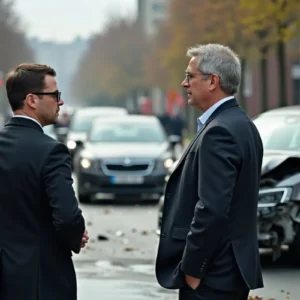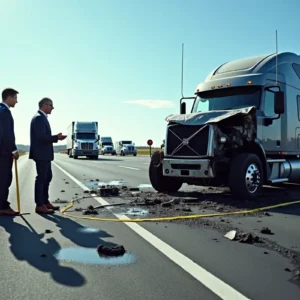When you’re involved in a car accident, the confusion and anxiety can be overwhelming. Understanding your rights and the actions you must take immediately can help safeguard your interests and increase your chances of fair compensation or successful recovery.
For those seeking skilled legal guidance, Boesen Law auto accident lawyers offer valuable support during these challenging times. Acting quickly and knowledgeably can make a crucial difference when navigating insurance claims, medical treatment, and legal procedures.
By following a systematic approach, you can help ensure your own safety and lay the groundwork for protecting your legal rights, should you need to pursue compensation. This guide breaks down the essential post-accident steps, so you know exactly what to do in the immediate aftermath and beyond.
Contents
Ensure Safety and Contact Authorities
Your first concern after an accident should always be the safety of everyone involved. If possible and safe, move your vehicle away from traffic to avoid additional hazards. Check on the well-being of passengers and other parties, calling 911 without delay if there are injuries.
Even minor accidents should be reported to law enforcement, as an official police report often serves as a critical piece of evidence for insurance claims and potential legal proceedings. Knowing what to do after a car accident in these early moments can make a major difference in protecting your health and rights.
Remain at the scene until authorities arrive, providing truthful information without speculating about fault or the cause of the accident. The responding officer’s report can carry significant weight during insurance negotiations or court cases.
Gather Evidence at the Scene
Thorough documentation strengthens your case and ensures you have accurate records. Take photos and videos of all vehicles involved, visible damage, the position of the cars, skid marks, debris, and relevant road signs or traffic controls. Don’t forget to photograph any visible injuries. Capture wide shots of the scene and close-ups of damage or contributing factors such as poor lighting or obscured signage.
Obtain the names, addresses, and phone numbers of everyone involved in the accident and witnesses. Note the responding officers’ badge numbers and contact information. Collect as much detail as possible—these records can be invaluable when recalling the exact circumstances or negotiating a settlement.
Seek Medical Attention Promptly
Many injuries—such as whiplash, concussions, or internal trauma—may not be obvious immediately after an accident. It’s essential to seek a medical evaluation, even if you think you aren’t hurt. Tell the provider you’ve been in a car accident, so all findings are appropriately documented. Prompt treatment protects your health and connects any injuries to the incident, which is important for pressing insurance claims or pursuing legal action.
If symptoms appear later, follow up with additional healthcare and keep all related records. Your accident file should include medical visits, prescriptions, and therapy sessions.
Notify Your Insurance Company
Most auto insurance policies require timely notification of an accident. Contact your insurer as soon as you can and provide only factual information. Avoid making statements about fault, and do not guess when explaining what happened.
Supply copies of the police report and any photographs you took. Immediate and accurate reporting helps ensure your claim moves smoothly and avoids delays or denials caused by missed deadlines or incomplete information.
Often, insurance adjusters will follow up with additional questions. Be honest and concise with your answers, and consider seeking advice before making detailed statements if serious injuries or liabilities are involved.
Avoid Admitting Fault
Emotions can run high after a car accident, but choosing your words carefully is critical. Avoid apologizing or admitting fault at the scene or when talking with insurance representatives. Fault is determined through police reports, insurance investigations, and, if necessary, the courts. Admitting fault can prematurely jeopardize your ability to seek compensation, even if a later investigation determines you were not at fault.
In the United States, the legal process relies heavily on objective evidence and investigative findings rather than subjective statements made in stressful conditions. Refraining from discussing blame helps keep your options open.
Consult a Legal Professional
When circumstances are complicated or serious injuries occur, consulting with an attorney can be indispensable. Legal professionals have the expertise to navigate complex insurance issues, negotiate settlements, and, if necessary, argue your case in court.
They can also help you understand your state’s statutes regarding car accidents, insurance limits, and deadlines for filing claims or lawsuits. Reputable sources provide additional guidance to learn more about legal aspects and representation.
Most car accident attorneys offer free consultations and work on a contingency basis, so you typically don’t pay unless they recover compensation on your behalf.
Maintain Detailed Records
Organize all paperwork associated with the accident in one place. This includes police reports, photos, medical records and bills, receipts for repairs, communications with insurance companies, and any documentation of lost wages or other accident-related losses. A well-kept record simplifies the claims and negotiation process and ensures nothing is overlooked.
Frequent updates, such as ongoing medical treatments or correspondence with your insurer, should be added to your file as your case progresses.
Be Cautious with Social Media
It’s natural to want to share experiences on social media, but after a car accident, it’s best to refrain from posting about the incident or your injuries. Insurance representatives and legal opponents may monitor your online activity for evidence to use against you, potentially undermining your claim. Even seemingly harmless posts can be misconstrued and negatively affect your case.
Following these important steps helps build a strong foundation for any insurance claim or legal action you might need to pursue. Taking initiative, staying organized, and securing qualified help greatly increase your ability to recover physically and financially after a car accident.




